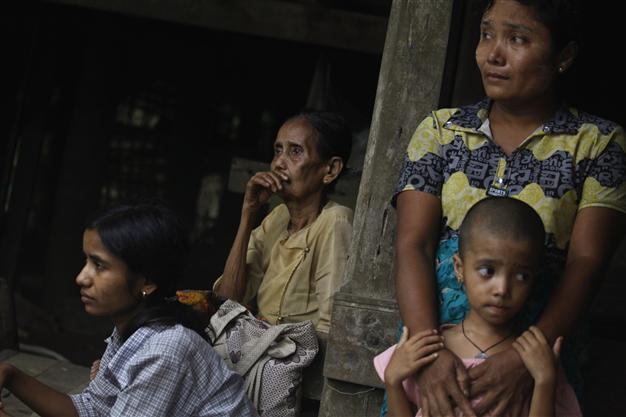Fear grips western Myanmar after five Muslims killed
THANDWE, Myanmar - Agence France-Presse

Members of a Muslim family react to the loss of a relative who died in the recent spate of violence in Myanmar's Rakhine state in Thapyuchai village, outside of Thandwe in the Rakhine state, October 2, 2013. REUTERS Photo
Terrified women and children hid in forests and security forces patrolled tense villages in western Myanmar on Wednesday, residents said, after sectarian clashes which left five Muslims dead.
President Thein Sein was expected to visit the violence-racked area as part of his first official visit to Rakhine state since a wave of religious bloodshed erupted there last year.
Sectarian bloodshed has overshadowed internationally praised political reforms and piled pressure on the former junta general, who took power in 2011.
The United States said it was "deeply concerned" about the latest unrest and urged authorities to respond "decisively", in a statement issued by its embassy in Yangon.
Around 800 Buddhist rioters torched homes and attacked local Muslims in a village in the area of Thandwe on Tuesday, according to the authorities.
"The death toll rose to five -- four men and a woman," a Rakhine police official who did not want to be named told AFP, adding that the victims were all killed during Tuesday's violence.
A 94-year-old Muslim woman, who suffered stab wounds, was among the dead. Four Rakhine Buddhists were injured in clashes and a fifth was missing, while 59 houses and a mosque have been torched since tensions flared on Saturday, police said.
Around 250 people have been killed and more than 140,000 left homeless in several outbreaks of inter-religious violence around the country since June 2012, mostly in Rakhine.
A local Muslim official told AFP that police had fired warning shots but could not control the mob.
"We are disappointed that we have a government that is unable to provide security for us," the official, Myint Aung, told AFP.
"We are living in fear. Many people, including women and children, are hiding in the forest nearby," he said.
AFP reporters on the scene saw a large security presence in the area, which appeared quiet on Wednesday. The region is home to the popular tourist destination of Ngapali Beach although no foreigners were believed to have been caught up in the unrest.
Thein Sein held meetings with members of Buddhist and Rohingya Muslim communities during his two-day tour.
He spent Tuesday visiting a different area of Rakhine populated mainly by stateless Rohingya Muslims.
In a message to a multi-faith conference, which was carried in state media on Wednesday, Thein Sein lamented "instigations fuelling minor crimes into conflicts between the two communities and two religions".
"Such instability based on religion and race harms and delays the state reforms and tarnishes the national image internationally," he warned.
Four major Myanmar Muslim organisations released an open letter to Thein Sein late Tuesday calling on the government to take urgent law-enforcement action.
"The concerns of minority Muslims around the country have reached peak levels. They feel they have no security," the letter said.
Two outbreaks of unrest in Rakhine state in June and October last year left about 200 people dead, mostly Rohingya who are denied citizenship by Myanmar and viewed by the government and many local people as illegal immigrants from neighbouring Bangladesh.
The conflict has since spread around the ethnically-diverse country, with members of the wider Muslim community targeted by armed Buddhist mobs.
The latest clashes follow an argument over a parking space near a Muslim home last week in Thandwe town. This triggered arson attacks against property owned by local Kaman Muslims -- an officially recognised minority.
Several more homes were torched in another village on Tuesday, as security forces fired some 30 warning shots to disperse two opposing groups of Buddhists and Muslims who had formed near the police station, authorities said.
Rights groups have in the past accused Myanmar security forces of complicity in the violence -- an allegation denied by the authorities.
Thousands of Rohingya boat people -- including women and children -- have fled the former junta-ruled country since last year, mostly heading for Malaysia on a perilous sea voyage.
